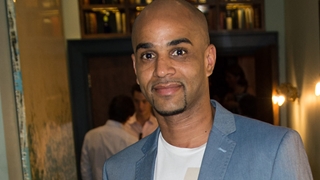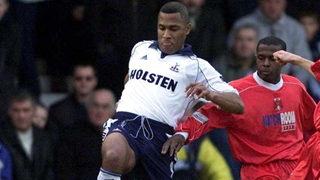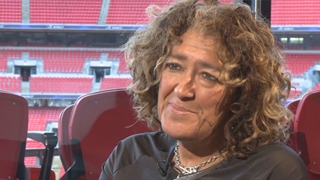
Hours after he tried to take his own life Leon McKenzie woke up in hospital, surrounded by weeping and worried family members.
It was 2009 and they had been here before – nine years earlier losing McKenzie’s sister Tracey to suicide – but the former Coventry City, Norwich City and Peterborough United striker just felt embarrassed.
The following day he discharged himself and drove straight to Charlton Athletic’s training ground – and did not tell a soul.
In the sanctuary of the dressing room players rarely discussed personal problems let alone shared their experience of depression.
“I literally tried to forget about what happened and get on with being a football player,” he said.
Forget healing. At least there he could be ignored.
Six years on and the 36-year-old has a delivery driving job to keep bankruptcy at bay and a super-middleweight title bout to prepare for.
He is training to be a counsellor too, so he can one day help people in the way others have helped him.
He looks fantastic, feels as fit as at any time in his football career, but depression remains the biggest fight of his life.
“This morning I woke up, had a little moment to myself, and I cried. I’ve had a couple of divorces, and I have money problems.
“For me, to not wake up with my children every day is enough to feel that kind of loneliness inside. I cry a lot because of the pain and guilt that I carry with things that have happened in my life.
“I don’t blame anyone apart from myself in terms of the situations I got myself into. But depression can happen to anyone.
“Everyone has that trigger and when you are depressed life can become a bit draining. It's tiring.”
McKenzie is not looking for sympathy. He is proud to have launched a second career as a boxer, following in the footsteps of his father Clinton and uncle Duke, and to have played football at the highest level.
But like last week’s mental health campaign Time to Talk suggests, he feels it is time to address the stigma and misunderstanding society can place on depression.
“I don't want to make it all about me. I share my story so others don't feel isolated”
Leon McKenzie
“When I finished football I felt a bit lost. I'd lost my way,” he said.
“I started realising that talking was therapeutic and I had random people contacting me, telling me thanks for being so open.
“That was a big insight: talking is a massive factor in healing and helping break down the stigma of depression.
“I'm not shy about sharing my story but don't want to make it all about me. I share my story so others don't feel isolated.”
He adds: “Whether you lose someone you love, or you lose your job, whether you get ill… whatever it is everyone has a trigger that can make you fall into a pattern of depression.
“Also it can be genetic, within my family there is a lot of it. If you don't respect it it can become a deeper, medical issue.”
McKenzie says there are many reasons why a footballer might not admit to a mental health problem.
“It was only after I retired that I was free to speak,” he said. “No player wants to be left out of the team because they suffer from depression.
“I had some of the baddest people in there coming in and talking to me, crying”
Leon McKenzie
“If that jeopardises your position within the team, you're naturally going to hide it.”
He continues: “For me I just didn't know who to go to.
“I'm not going to knock on my manager's door and say 'I tried to take my own life last night'. So I used to lock myself away and felt totally isolated.”
In 2011 McKenzie was sentenced to six months in prison after sending bogus letters to avoid a driving ban.
He reminisces: “I was so scared. I went into an A category with murderers, rapists... and I’m sharing a cell with these people.
“But I went in there for a reason. And as a footballer I had some of the baddest people in there coming in and talking to me, crying.
“I’m finding myself counselling in prison, because they are coming to me as someone who has been there, and done that, but they also see the pictures of my kids on my wall.
“They come to me and cry and say ‘I miss my kids’, and we can all relate to that.
“So all of a sudden I can relate to these people who I could never relate to before.”
And that is when McKenzie stops to consider football’s problem. In prison he found people more open to talking about mental health than in any dressing room.
McKenzie recognises a need for change, and supports the work of the Professional Footballers' Association, who 18 months ago launched its Player Welfare Department, with offices in London and Manchester.
The FA has highlighted mental health as a key part of its inclusion and anti-discrimination work, and helps to fund the Sporting Chance rehabilitation clinic.
“It’s a good thing that the PFA are training counsellors. I’m training at the moment,” he says.
“It’s going to take me three years to become a qualified counsellor and work as one.
“A lot of players came to me when I wasn’t qualified to counsel them, but I still tried to help.
“Footballers need to be able to relate to the individual. It’s all well and good to be a counsellor but if you have not really experienced the footballer’s life, then it’s hard to understand.”
At times McKenzie finds his own life hard to comprehend.
“I was a footballer for 18 years, playing in all top four divisions, and scoring in all divisions, scoring 115 goals. But that stopped,” he says.
“Even though I am in my second career as a professional boxer and am doing fantastic again, I now work for a living.
“I work for DPD as a courier driver, get up at six, go to the depot for seven, work until five.
“I go from scoring goals to scanning barcodes. It’s a massive transition.
“All of a sudden I’m living in a one-bedroom flat, starting again”
Leon McKenzie
“Some mornings I come in and look around and go ‘wow’, and sometimes I have a tear in my eye.
“But circumstances change: I’ve had a couple of divorces and money problems. All of a sudden I’m living in a one-bedroom flat, starting again.
He laughs, and says: “I’d like to say that I am doing as well as I can to make this transition.
“People say 'so you are alright now Leon because you're doing well boxing-wise?’.
“I'm like ‘no’, I still suffer, but I have learned how to deal with it and how to recover. That's the difference.”














